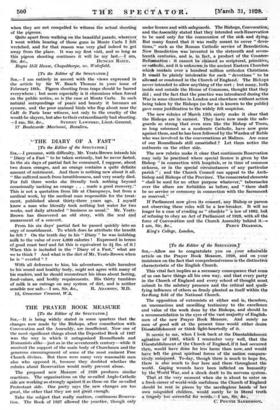THE PRAYER BOOK MEASURE
[To the Editor of the SPECTATOR.] SIR,—It is being widely stated in some quarters that the changes now made by the Bishops, after consultation with Convocation and the Assembly, are insufficient. Now one of the most significant things about the Deposited Book of 1927 was the way in which' it antagonized Roundheads and Romanists alike—just as in the seventeenth century—while it received the support of the main body of Churchmen and the generous encouragement of some of the most eminent Free Church divines. But there were many very reasonable men also who opposed it, becauee they doubted whether the rubrics about Reservation would really prevent abuse.
The proposed new Measure of .1928 produces similar reactions. The organizations on the so-called Anglo-Catholic side are working as strongly against it as those on the so-called Protestant side. One party says the. new changes are too great, the other that they are not great enough.
Take the subject that really matters, continuous Reserva- tion. The Book of 1927 allowed the practice, though only under licence and with safeguards. The Bishops, Convocation; and the Asseinigy stated that' they intended such Reservation to be used -only for the communion" of the sick and dying. But many feared that it' was really meant to cover " deve■ tions," such Is the Roman Catholic service of Benediction. Now Benediction was -invented in the sixteenth and seven- teenth centuries, and is, in fact, a product of the Counter* Refeinnition : cannot be chained 'as scriptural, priMitive; or catholic, and it is unknown in the ancient Eastern Churches which Contain over a hundred million orthodox Christiana: It Would be plainly Intolerable for such " deVotions " to be alloyard or condoned in the Church bf England:- The Bishops never intended to allow anything of the sort ; but many, both inside and Outside the House' of Commons, thought that they did ; and the fact that the practice was introduced during the War in soine Chinches in Lcindon and elsewhere-without action being taken by the Bishops (so far as is known to the public) gave some justification to the widely felt suspicion.
The new rubrics of kareh 15th surely make it clear that the Bishops are in earnest. They haie now Made the safe- guards so strong that even men like the 'Bishop of Truro, so long esteemed as a moderate Catholic, have now gone against them, and he has been followed by the Warden of Keble who was involved in the conversations at Malines. Are some of our Roundheads still nnsatisfied I Let them notice the outbursts on the other side.
The new rubrics make it clear that continuous Reservation may only be practised where special licence is given by the Bishop " in connection with hOspitals, or in time of common sickness, or in the special circumstances Of- any particular parish " ; and the Church Council can appeal to the Arch bishcip and Bishops' of the Provinee: The consecrated elements " shall be used for no other purpose WhateVer," tabernacles over the altars are forbidden as before; and "there shall'- be no service or ceremony in connection with the Sacrament so reserved." - If Parliament now gives its consent, any Bishop or parson not observing these rules will be a law-breaker. -It will no longer be a case of evading as " obsolete" a law of 1662, bul of refusing to obey an Act of Parliament of 1928, with all the force of, Convocation and the Church Assembly behind it—.


































 Previous page
Previous page